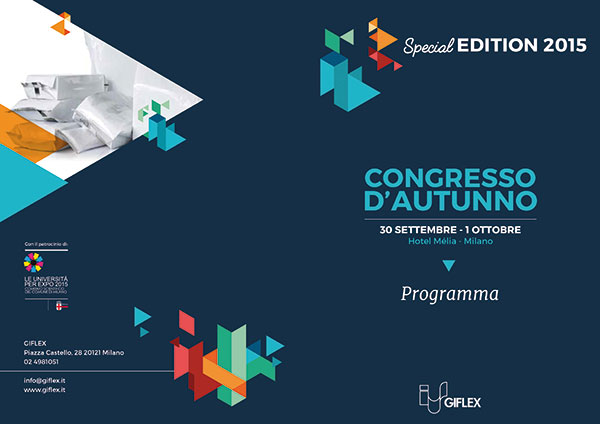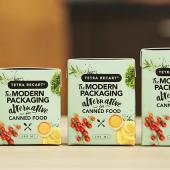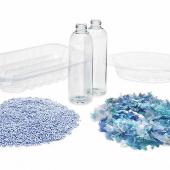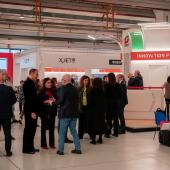Feeding the brain
News and - to paraphrase Expo - brain food from the 30th Giflex Autumn Congress, which hasn’t slowed down and makes a strong case for its commitment to thinking about food and reducing waste. International guests in Milan were treated to a relaxed and impartial dialog from which packaging - and not just of the flexible variety - emerged strengthened in its role as an indispensable tool in the fight against food waste.
Developing a sustainable food system is an extremely complex topic. Indeed, numerous factors are at play, also when one considers the many actors involved in the supply chain, who now more than ever have a responsibility to share visions and strategies in order to define reasoned development policies. To this end, the Giflex Congress (Milan, 30 September - 1 October) did the service of bringing to the discussion table traditionally opposing “factions”: representatives of institutions, industry, distribution and consumers, academics and researchers. In the last analysis, all of them agreed on the important role of packaging in preventing food waste, optimizing economic and environmental resources and acting as an ideal means for encouraging consumers (particularly western ones) to adopt more informed and conscientious consumption habits.
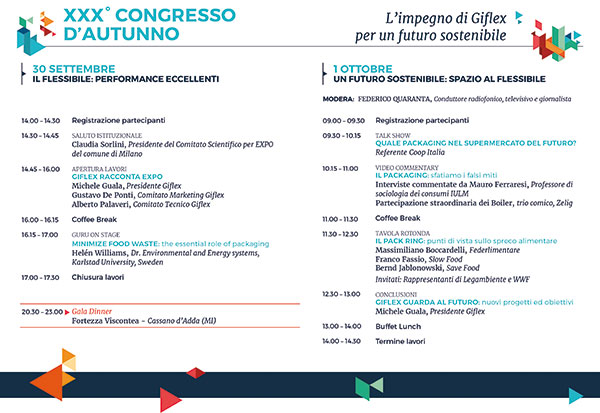
Rethinking models
It’s important to recall the distinction between food waste and food loss, something to which various experts have dedicated themselves. It is in the advanced western economies that the most food is wasted, due to excessive acquisitions, poor stocks management in industry or in the home, etc., as opposed to food loss, which, by contrast, occurs during production, processing and distribution especially in less industrialized countries. And while Bernd Jablonowski, head of the Save Food initiative, affirmed, while discussing the Mango Project in Kenya, that in developing regions custom technological packaging solutions are needed that are adapted to valorizing and marketing the specific resources of each place, it was Helén Williams of Karlstad University who stressed that in “our” part of the world, it is still necessary to design innovative packaging with the most appropriate formats for preventing waste. In “developed” countries, for example, an enormous quantity of food is thrown away due to a passed expiry date, and for this reason, packaging needs to be “smarter” by communicating the level of freshness and preservation of a product. As Carmela Favarulo of COOP (National Consumer Cooperatives Association - Social Policies Sector) explained, a legislative effort is also necessary. «COOP is currently working on multiple fronts to minimize food waste: awareness campaigns in schools, streamlining stocks, responsible promotional policies that don’t induce overstocking (like the classic “3 for the price of 2” promotions), donating to NGOs…».
On this last point, Favarulo remarked that «if it were possible to also donate products whose expiry date has passed, as in many other countries, we could create an even more virtuous industry».
Her comments were echoed by those of Rossella Muroni, General Director of Legambiente, who suggested that legislators should reward and incentivize operators who adopt sustainable policies, with benefits to society. Claudio Ramonda (University of Pollenzo - Slow Food) also focused on the central role of people, referring to a “natural” production model, alternative to the current one, in which all is interconnected and in which the right amout of food is produced, minimizing the environmental impact of processes. On the other hand, according to Massimiliano Boccardelli, Federalimentare’s head of Industrial and Supply Chain Policies, Parliamentary Relations and Lobbying, food sector operators are already seriously engaged (and committed) to not wasting the raw materials they acquire, making value of processing byproducts and “making quality”, putting products and packaging on the same level.
The value of communication
In fact, packaging is not just an instrument for protecting food, but is also the element on which the relationship between manufacturers and consumers is based. A lot depends on better communicating its characteristics… In an offbeat interview conducted by the sketch comedy troupe Zelig, sociologist Mauro Ferraresi made a earnest plea for considering information asymmetries, by which the producers know their goods inside-out, while the consumer doesn’t always have the means to understand a product’s “true” value. «Too often consumers accuse the packaging of being redundant and perceive it as waste. It is therefore necessary to imagine packaging that is more oriented toward minimalism, capable of drawing attention but also of encouraging brand loyalty through the values of transparency and sustainability». In other words, consumers want to know more and more about the history of the products they purchase. This is what Coop brought to the table, as the large retailer’s Food Market Operations Director Massimiliano Lazzari explained concerning the supermarket of the future set up at Expo, conceived as a traditional market square, with no high shelves in order to give a panoramic view of the space. This demo supermarket included products that talk, a layout in line with this concept, augmented reality labels able to translate information into plain and simple language and more. In practice, each product must know how to tell its story, not just in relation to its own origin, but also the technologies used to make its consumption possible. «Today – Lazzari was careful to stress – we are asking packaging producers to help us prolong the shelf life of fresh products, because the average consumer conducts their grocery shopping no more than once per week. The new preservation technologies also need to be explained, since the consumer could be led to believe that packaging compromises the natural quality of the product if it can be preserved for a longer time than one is used to».
Flessibili, impegnati e soddisfatti
During the two-day event in Milan, Giflex of course addressed the association’s own activities, reconnecting with its recently published position statement “Giflex commitment to a sustainable future 2015”, a document that underlines, with scientific evidence, the value of flexible packaging and its capacity for contributing to the reduction of food waste.
In his address, head of the Giflex technical committee Alberto Palaveri reminded attendees that «the food wasted every day in the home because it has gone bad or wasn’t eaten pollutes five times more than the amount of packaging that would have been required in order to preserve it longer». But he was also careful to point out that, although flexible packaging is the lightest type and thus the packaging with the lowest environmental impact, it is not always recyclable today.
Giflex is thus working to find solutions to make value of the waste produced during the production phase, and more generally, at the European level, is following and supporting initiatives that make complete recyclability of these materials a reality.
For his part, Gustavo De Ponti, head of the marketing committee, summarized the association’s commitment to educating consumers about the real value of packaging, starting with schools.
Very important in this arena is the YOUPACK contest, an initiative organized annually by Giflex in order to raise awareness among the younger generations through imagining and presenting the perfect “sustainable packaging”. Awards for the two winning videos were presented during the event in Milan, with an additional surprise in the form of a scholarship for the girls who made them, offered by the Rossini SpA company and presented by Felice Rossini himself.
To conclude the event, Giflex President Michele Guala, after voicing a special recognition for the sponsors of the 2015 Congress, Dec Impianti and W&H Italia, represented in person by Luciano Formigoni and Enrico Vogogna, summed up well the spirit of the meeting: «Flexible packaging is just a small actor in a wider system, but we wished to create a space for dialog in order to demonstrate our willingness to put ourselves out there and commit to working toward a sustainable future».
Mission accomplished. Good job.



